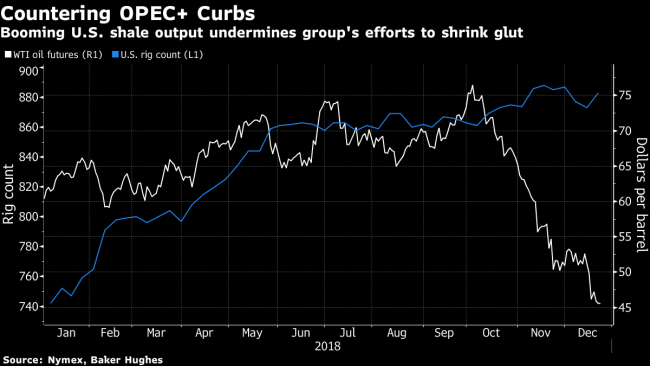(Bloomberg) -- Oil held losses near $46 a barrel as worries over U.S. supplies and the global economy overshadowed signals from OPEC that it may extend or even deepen its pledged output curbs.
Futures were little changed in New York, after declining 11 percent last week -- the most since January 2016. Officials from Iraq, Kuwait and the United Arab Emirates agreed with Saudi Arabia’s expectation that the group will extend its cuts for another six months. The U.A.E.’s energy minister, while stressing that the agreed 1.2 million barrel-a-day reduction will clear a glut in the first quarter, hinted additional curbs could be discussed.
The market remains skeptical over the effectiveness of the curbs by the Organization of Petroleum Exporting Countries and its allies including Russia because of surging American shale production. While the U.S. is pumping at record levels and inventories are also high, President Donald Trump’s trade war with China and the Federal Reserve’s rate-hike policy are raising concerns over the health of the global economy. Prices have collapsed 40 percent from a four-year high in October.
“Incredibly, in the face of even deeper production cuts, petroleum markets have hit fresh lows,” said Stephen Innes, the head of trading for Asia Pacific at Oanda Corp. in Singapore. “While the production cut should restore a semblance of supply balance in the first half of 2019, global growth concerns and shale production have investors deeply concerned.”
West Texas Intermediate for February delivery was at $46 a barrel on the New York Mercantile Exchange, up 41 cents, at 1:10 p.m. in Seoul. The contract lost 0.6 percent to close at $45.59 on Friday. Total volume traded was about 15 percent above the 100-day average.
Brent for February settlement was 58 cents higher at $54.40 a barrel on London’s ICE (NYSE:ICE) Futures Europe exchange. Prices declined 10.7 percent last week to settle at $53.82. The global benchmark crude traded at an $8.41 premium to WTI.
See also: Oil Seesaws in 2018 as Talk Swings From $100 to Glut: Chart
The U.A.E.’s Suhail Al Mazrouei said while the production cuts have been carefully studied, there’s always an option for a discussion if more than what’s planned is required. At a press briefing in Kuwait, ministers from Iraq, the U.A.E. and Algeria took turns repeating the message that OPEC will deliver its cuts.
In the U.S., working oil rigs gained by 10 to 883 last week, according to data released Friday by oilfield services provider Baker Hughes. More than 100 additional rigs have been deployed across American fields this year. At the same time, the country’s crude production remains near the record level of 11.7 million barrels a day, according to government data.
